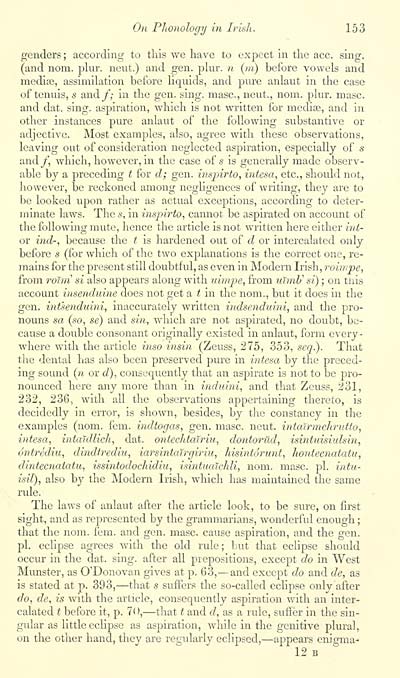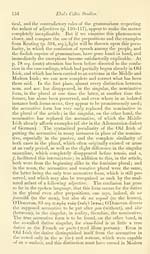Blair Collection > Celtic studies
(185)
Download files
Complete book:
Individual page:
Thumbnail gallery: Grid view | List view

On Phonology in Irish. 153
£fcnders ; according to this wc have to expect in the ace. sing,
(and nom. plur. neut.) and gen. plur. n (in) before vowels and
mediae, assimilation before liquids, and pure anlaut in the case
of tenuis, s and/; in the gen. sing, masc, neut., nom. plur. masc.
and dat. sing, aspiration, which is not written for medias, and in
other instances pure anlaut of the following substantive or
adjective. Most examples, also, agree with these observations,
leaving out of consideration neglected aspiration, especially of s
and/, which, however, in the case of s is generally made observ-
able by a preceding t for d; gen. insjnrto, intesa, etc., should not,
however, be reckoned among negligences of writing, they are to
be looked upon rather as actual exceptions, according to deter-
minate laws. The s, in inspwto., cannot be aspirated on account of
the following mute, hence the article is not written here either hit-
or ind-i because the t is hardened out of d or intercalated only
before s (for which of the two explanations is the correct one, re-
mains for the present still doubtful, as even in Modern Irish, roiwpe,
from rowi si also appears along with uiinpe, from uiml) si) ; on this
account insenduine does not get a t in the nom., but it does in the
gen. intsenduini, inaccurately written vidsenduini, and the pro-
nouns sa {so, se) and sin, which are not aspirated, no doubt, be-
cause a double consonant originally existed in anlaut, form every-
where with the article inso insin (Zeuss, 275, 353, seq). That
the dental has also been preserved pure in intcsa by the preced-
ing sound {n or d), conseqiiently that an aspirate is not to be pro-
nounced here any more than in induini, and tliat Zeuss, 231,
232, 236, with all the observations appertaining thereto, is
decidedly in error, is shown, besides, by tire constancy in the
examples (nom. fern, indtogas, gen. masc. neut. intairmchrutto,
intesa, intaidlich, dat. ontechtatriu, dontorud, isintuisiulsin,
ontrediu, dindirediu, iarsintairgiriu, hisintorunt, hontecnatatii ,
dintecnatatu, issintodochidiu, isintumchli, nom. masc. pi. inhi-
isil), also by the Modern Irish, which has maintahied the same
rule.
The laws of anlaut after the article look, to be sure, on first
sight, and as represented by the grammarians, wonderful enough ;
that the nom. fem. and gen. masc. cause aspiration, and the gen.
pi. eclipse agrees with the old rule; but that eclipse should
occur in the dat. sing, after all prepositions, except do in West
Munster, as O'Donovan gives at p. 63,— and except do and de, as
is stated at p. 393, — that s suffers the so-called eclipse only after
do, de, is with the article, consequently aspiration with an inter-
calated t before it, p. 70, — that t and d, as a rule, suffer in the sin-
gular as little eclipse as aspiration, while in the genitive plural,
on the other hand, they are regularly eclipsed, — appears enigma-
12 B
£fcnders ; according to this wc have to expect in the ace. sing,
(and nom. plur. neut.) and gen. plur. n (in) before vowels and
mediae, assimilation before liquids, and pure anlaut in the case
of tenuis, s and/; in the gen. sing, masc, neut., nom. plur. masc.
and dat. sing, aspiration, which is not written for medias, and in
other instances pure anlaut of the following substantive or
adjective. Most examples, also, agree with these observations,
leaving out of consideration neglected aspiration, especially of s
and/, which, however, in the case of s is generally made observ-
able by a preceding t for d; gen. insjnrto, intesa, etc., should not,
however, be reckoned among negligences of writing, they are to
be looked upon rather as actual exceptions, according to deter-
minate laws. The s, in inspwto., cannot be aspirated on account of
the following mute, hence the article is not written here either hit-
or ind-i because the t is hardened out of d or intercalated only
before s (for which of the two explanations is the correct one, re-
mains for the present still doubtful, as even in Modern Irish, roiwpe,
from rowi si also appears along with uiinpe, from uiml) si) ; on this
account insenduine does not get a t in the nom., but it does in the
gen. intsenduini, inaccurately written vidsenduini, and the pro-
nouns sa {so, se) and sin, which are not aspirated, no doubt, be-
cause a double consonant originally existed in anlaut, form every-
where with the article inso insin (Zeuss, 275, 353, seq). That
the dental has also been preserved pure in intcsa by the preced-
ing sound {n or d), conseqiiently that an aspirate is not to be pro-
nounced here any more than in induini, and tliat Zeuss, 231,
232, 236, with all the observations appertaining thereto, is
decidedly in error, is shown, besides, by tire constancy in the
examples (nom. fern, indtogas, gen. masc. neut. intairmchrutto,
intesa, intaidlich, dat. ontechtatriu, dontorud, isintuisiulsin,
ontrediu, dindirediu, iarsintairgiriu, hisintorunt, hontecnatatii ,
dintecnatatu, issintodochidiu, isintumchli, nom. masc. pi. inhi-
isil), also by the Modern Irish, which has maintahied the same
rule.
The laws of anlaut after the article look, to be sure, on first
sight, and as represented by the grammarians, wonderful enough ;
that the nom. fem. and gen. masc. cause aspiration, and the gen.
pi. eclipse agrees with the old rule; but that eclipse should
occur in the dat. sing, after all prepositions, except do in West
Munster, as O'Donovan gives at p. 63,— and except do and de, as
is stated at p. 393, — that s suffers the so-called eclipse only after
do, de, is with the article, consequently aspiration with an inter-
calated t before it, p. 70, — that t and d, as a rule, suffer in the sin-
gular as little eclipse as aspiration, while in the genitive plural,
on the other hand, they are regularly eclipsed, — appears enigma-
12 B
Set display mode to: Large image | Transcription
Images and transcriptions on this page, including medium image downloads, may be used under the Creative Commons Attribution 4.0 International Licence unless otherwise stated. ![]()
| Early Gaelic Book Collections > Blair Collection > Celtic studies > (185) |
|---|
| Permanent URL | https://digital.nls.uk/75773397 |
|---|
| Description | A selection of books from a collection of more than 500 titles, mostly on religious and literary topics. Also includes some material dealing with other Celtic languages and societies. Collection created towards the end of the 19th century by Lady Evelyn Stewart Murray. |
|---|
| Description | Selected items from five 'Special and Named Printed Collections'. Includes books in Gaelic and other Celtic languages, works about the Gaels, their languages, literature, culture and history. |
|---|

